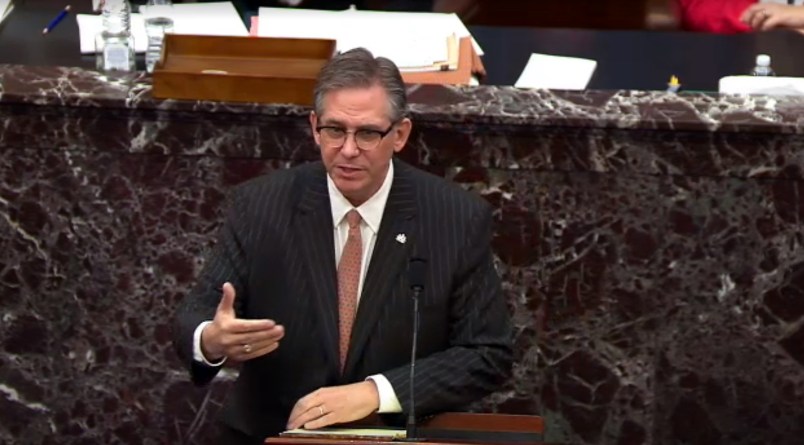When members of the U.S. Senate returned for the second half of Tuesday’s impeachment proceedings, they were probably not expecting a breakdown of the mechanics of a record player, an ode to the late Sen. Everett Dirksen’s (R-IL) voice and an elegy on what makes senators special.
Pennsylvania-based attorney Bruce Castor kicked off former President Trump’s defense in the proceedings. He got off to a rocky start when he initially described himself as the “lead prosecutor.”
“I was an assistant D.A. for such a long time I keep saying prosecutor, but I do understand the difference,” Castor assured the world’s greatest deliberative body.
But, judging by his rambling remarks, that may not have been simply a case of the nerves knocking him off his initial footing. Castor’s thoughts were all over the place when it came to what was relevant to the question of whether Trump’s trial was constitutional.
It took nearly 30 minutes to reach what seemed to be the point of his presentation: that impeaching Trump would be a “slippery slope” because he is already out of office. Trump’s team has only two hours to argue its claims before a vote on whether the trial is constitutional.
As he searched for that point, Castor jumped around among various topics whose connections to the current proceedings — where Trump is accused of inciting an insurrectionist mob — were tenuous at best. (The lawyer’s “conduit” to the Trump defense team, he told The Washington Post, was his cousin Stephen Castor, a Republican staff attorney who noticeably stumbled through Trump’s first impeachment.)
The Trump attorney recounted working for the Senate several decades ago (“I got lost then, and I still do”). He analyzed the late Senator Dirksen’s voice (“commanding,” “gravely” and oozing with “belief and sincerity”). An early discussion on the difference between murder and manslaughter (“cold blood”) pivoted, without much explanation, to praise of the assembled senators (who are, “in the technical sense, extraordinary people”).
“Nebraska is quite a judicial-thinking place,” he observed at one point.
He got up to speak after the House managers had delivered a tight and sharp collection of arguments for why the impeachment trial of the former President should proceed. It was never going to be easy to follow Rep. Jamie Raskin’s (D-MD) stirring remarks, which included a personal account of having his family — who had recently buried Raskin’s son — with him at the Capitol the day of riot.
If Castor was choosing between pushing back too harshly at an extremely sympathetic presentation or tip toeing clumsily around the heightened emotions in the room, he erred very much on the latter side.
When he did engage directly with the House’s arguments, his rebuttals were scattershot as well.
At one point, Castor noted that the House managers had pointed to the historical context the American founders considered during their own constitutional convention, including that of a British colonial official who served in India and who was impeached after ending his service.
“I can’t believe these fellas are quoting what happened pre-Revolution, as though that’s somehow of value to us. We left the British system!” he bellowed. “If we’re really going to use pre-Revolutionary history in Great Britain, then the precedent is we have a parliament and we have a king. Is that the precedent that we are headed for?”
As he was wrapping up the one-hour stemwinder, Castor acknowledged the House managers had given him a tough act to follow.
“I thought that the House managers who spoke earlier were brilliant speakers,” he said, before claiming without any explanation that the managers had failed to prove that Trump’s trial was unconstitutional.
He added a few minutes later: “I’ll be quite frank with you, we changed what we were going to do on account that we thought that the House manager’s presentation was well done.”







Better Call Saul. Or: Better Call Paulie Shore.
This is the kind of “defense” your lawyer provides when he knows the fix is already in. This dude’s basically trolling the Senate.
I’m not a lawyer, but I thought Castor wandered off the beaten path of recognizing in American law, at times, English Common Law when he declared… “I can’t believe these fellas are quoting what happened pre-Revolution, as though that’s somehow of value to us. We left the British system!” he bellowed. “If we’re really going to use pre-Revolutionary history in Great Britain, then the precedent is we have a parliament and we have a king. Is that the precedent that we are headed for?”
Am I wrong to think references to English Common Law in American jurisprudence are not uncommon?
Ah, the classic baffle them with bullshit defense.
Castor was embarrassing. Even if it was necessary to address something the House Managers brought up that the “defense” hadn’t anticipated, the kick off of his speech should have been coherent and concise and well delivered. His opening was NONE of these, starting off with a lengthy buttering up of the Senate itself.
I’m convinced he was actually up there just to stall for time so that Schoen could finish writing “new” arguments. While I don’t agree with much of what Schoen is saying, at least he is performing well. He surely is “righteously incensed” by these proceedings…or at least he is well practiced.